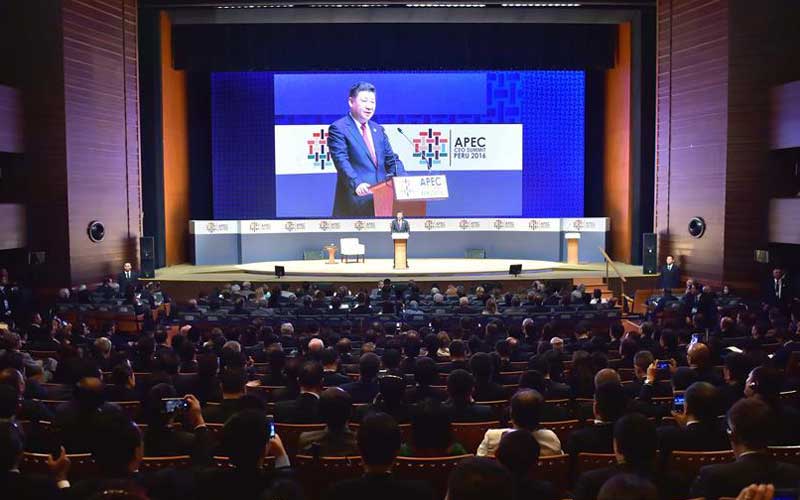Chinese President Xi Jinping’s keynote speech at the Asia Pacific Economic Cooperation (APEC) CEO Summit on Saturday in Lima, Peru, placed China and the region at the forefront of a joint effort to reactivate the global economy, APEC participants and scholars have said.
Mario Mongilardi, president of the Lima Chamber of Commerce, believed Xi sent an encouraging message to the business communities of the 21 APEC members.
“The president of China made an extraordinary speech today. He laid out the bases for the future growth of the world economy,” Mongilardi told Xinhua in an interview following the summit.
It was made clear that China’s program of reforms will allow the participation of foreign companies in the Chinese market, which would offer other APEC members potential access to over 1.3 billion consumers, said Mongilardi.
“He (Xi) also announced that China would reach out to the world with very important investments and open its market up to foreign investments. It fills us with optimism to see that China, one of the world powers, believes in the market, believes in competition … as a mechanism for development,” Mongilardi said.
At the summit, Xi said that China must energize trade and investment to drive growth, and will make free trade arrangements more open and inclusive.
Martin Monteverde, president of the National Confederation of Private Entrepreneurial Institutions, said after the summit that Xi’s speech showed China’s willingness to work with others to develop the economy.
Xi said it is estimated that in the next five years China will import eight trillion U.S. dollars of goods, and introduce 600 billion dollars of foreign investment. This will provide great opportunities for Latin American companies, said Monteverde.
Xi said that in the first three quarters this year, China’s gross domestic product (GDP) grew by 6.7 percent. This rapid economic growth will benefit Latin America, especially in areas such as mineral and energy resources, said another APEC participant, Alvaro Barrenechea, corporate affairs manager for Chinalco in Peru.
More than 30 percent of all foreign investments in Peruvian minerals came from China so far. Xi said that in the next five years China will invest 750 billion dollars overseas. This means that all Latin American countries will benefit from China’s opening its market up to foreign investments, Barrenechea said.
Jose Picasso, chairman of Peruvian mining company Volcan, regarded Xi’s speech as the best at the summit.
Xi’s speech showed that China is willing to open up its market and narrow down the polarization of wealth. China’s development will be an impetus for the development of the Asia-Pacific region, Picasso said.
At a time when much of the rest of the world is suffering from economic slowdowns, the Asia-Pacific region is enjoying steady growth, said Xi, and as such it must lead the way and take strong and coordinated actions to energize the world economy and create new opportunities for global growth.
Luis Delgado, a professor of social studies at the state University of Carabobo in northern Venezuela, said “the speech marks the route the Chinese government is proposing to reactivate the world economy,” and indicates “how the Asia-Pacific region can be the vanguard in the reactivation of the world economy.”
Xi’s message also places China at the forefront of that effort, because it “revindicates the free market, but it does so from a comprehensive perspective,” which calls for “growth that must be accompanied by human development schemes,” said Delgado.
In addition, the Asian giant has already taken the lead to do so in different parts of the world, such as Latin America, where “China has committed to the development” of the region in the coming years, said Delgado.
“With Latin America’s potential and the support of the Chinese government, I think it is possible for the region to overcome difficulties,” such as lack of development, infrastructure and investment, and “to reactivate the world economy,” he said.
“I believe China wants to create all of the conditions for the free movement of capital, and in that way strengthen the dynamism of the world economy,” he added.
In that sense, the 2016 APEC meetings in Lima may mark a turning point in the global economic balance, he said.
“The historic context and historic significance of this process mark a relocation of the world’s geo-economic center, which was in the Atlantic, to the Pacific, and in the midst of this, China plays a leading role,” said Delgado.
Venezuelan economist and political analyst Vladimir Adrianza, who teaches at the Bolivarian Military University of Venezuela in Caracas, agreed that Xi’s speech is evidence of “the transfer of the geo-economic center towards the Pacific.”
It also signals an awareness of the disadvantages that have afflicted smaller economies in the traditional global economic order, Adrianza said.
Xi’s speech “gives us an idea of the willingness on the part of China’s current leadership to pursue an understanding with economies that are much smaller than China’s,” he said.
Established in 1989 as a forum to promote free trade throughout the Asia-Pacific region, the 21-member APEC is becoming an increasingly important mechanism to address economic issues not only within the region, but also around the world.
APEC has played an important role in advancing trade liberalization and facilitation, promoting economic integration and boosting connectivity.
The Asia-Pacific region, which is vital to global peace and development, accounts for 40 percent of the world population, around half of world trade, and 57 percent of the global GDP.
